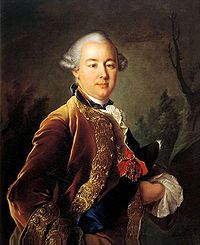- Pyotr Sheremetev
-
The coat of arms of Count Sheremetev Information Shield Or in chief on a torteaux surrounded by a wreath of laurel a royal crown proper and two crosses pattée argent in pale and in base a sword and spear crossed in saltire proper between a boyar's hat fesswise and a crescent with a representation of a man's face, the whole ensigned by the coronet of a Count of the Russian Empire. Crest and mantle Issuant from a coronet of a count an oak tree proper between two mullets of six points argent, the mantling Or doubled gules. Supporters Two lions salient guardant Or the dexter one holding in his interior paw a sceptre and in his mouth a laurel branch proper the sinister one holding in his interior paw a globus cruciger and in his mouth an olive branch proper upon a grassy compartment proper Pyotr Borisovich Sheremetev (Russian: Пётр Бори́сович Шереме́тев) (1713–1788) was a Russian nobleman and courtier, the richest man in Russia aside from the tsar; he was the son of Boris Sheremetev.
When his father Boris died in 1719, tsar Peter promised to be "like a father" to Boris's children, and young Pyotr was brought up at court as a companion to the heir to the throne, who became tsar Peter II.
After a teenage career in the Guards, Sheremetev became a chamberlain to the Empress Anna, and then to the Empress Elizabeth. Under Catherine the Great, he became a senator and was the first elected Marshal of the Nobility. Unlike other court favourites, who rose and fell with the change of sovereign, Sheremetev remained in office for six consecutive reigns. ... He was one of Russia's first noblemen to be independent in the European sense.[1]
He was a lover of art and theater, using his vast wealth to remodel the Sheremetev Palace (known as the "Fountain House") on the Fontanka Embankment and the family estate at Kuskovo, where he collected a gallery of portraits, and to create a famous serf orchestra.
He married Varvara Alekseevna Cherkasskaya, daughter of an important court official, who brought him an expensive dowry.
See also
- Natalia Sheremeteva - his sister
Notes
- ^ Orlando Figes, Natasha's Dance (Picador, 2002), p. 19.
Categories:- 1713 births
- 1788 deaths
- Russian nobility
- Sheremetev family
- Recipients of the Order of the White Eagle (Poland)
- Recipients of the Order of St. Andrew
Wikimedia Foundation. 2010.

